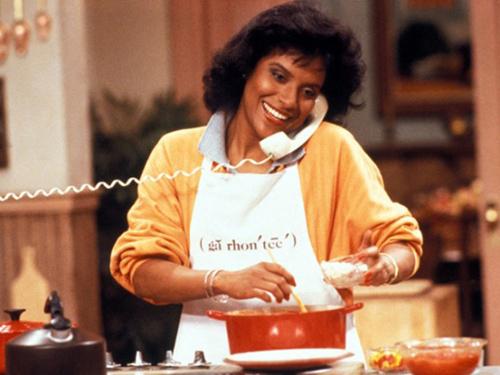
Women have been taught from birth that we have to take care of our man. While the values of current generations are debatable, I remember seeing what being a homemaker looked like. While I admired the women in family’s ability to work a 9 to 5 and still manage to have the kids home from school and dinner on the table, I see that relationships have taken a turn for the worse. The expectations of men have become more and more polarized from the health of the marital unit and this translates even deeper with relationships that have not yet reached marital bliss.
Claire Huxtable of The Cosby Show, played by Phylicia Rashad, represented the role of a wife with such duality and tact. She, like many women, did not associate taking care of your man as synonymous with serving your man. “You see I’m not serving Dr. Huxtable, okay? That’s the kind of thing that goes on in a restaurant. Now I’m going to bring him a cup of coffee like he brought me a cup of coffee this morning and that young man is what marriage is made of. It is give and take, 50/50.” That was her response to her daughter’s boyfriend Alvin who expressed how surprised he was that she was willing to serve her husband. The association of giving being serving implies that little has to be returned to women should they assume that rule of always giving.
As a response, women give less especially if the effort is not returned yet the response to that reluctance is women being labeled as selfish. Subservience is seen as a necessity in order to find or keep a man, which can translate into giving up your job to relocate to wherever he is, putting their needs before your own and even going to the store solely to run their errands. After reading an article on Essence.com discussing ‘The Errand Girl,’ I realized how our generation has married the idea of serving with being in a 50/50 relationship. The writer learned that her behavior in previous relationships lent herself to playing the role of the ‘suga mama’ rather than the girlfriend, constantly putting their needs and wants before her own and not getting the same treatment consistently in return.
She learned that being selfish is not something to look down upon but being selective in how much you give is necessary to building a healthy relationship with anyone. Once a person knows they are able to take without giving, they will never see the need to give as selflessly. Not everyone is mature enough to understand that an equal effort is necessary to having a healthy and happy life. However, being able to navigate through those people is difficult when we let our maternal nature take over.
Women are naturally inclined to give. Our maternal instincts lend themselves to giving selflessly, especially to the ones we love. But what human nature does not inbred is the ability to being selective in who we share this God given quality to – we weren’t born with the ability to give to the ones we love who love and respect us just as much. It is important as a human being to always look out for yourself first, and love yourself enough to know that it is okay to reserve certain privileges to people who have proved they will appreciate it.
If being selfish means being selective, then I will gladly assume that title proudly. Subservience only benefits the person being served. It does nothing for the person who is giving, especially if said subservience is happening outside of service oriented job. I am not in the business of bringing community service into a relationship, and neither should any self-respecting individual.
